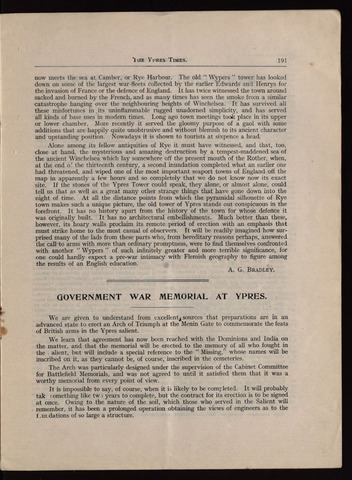GOVERNMENT WAR MEMORIAL AT YPRES.
'liie Yi'res Times.
191
now meets the sea at Camber, or Rye Harbour. The old Wypers tower has looked
down on some of the largest war-fleets collected by the earlier Edwards and Henrys for
the invasion of France or the defence of England. It has twice witnessed the town around
sacked and burned by the French, and as many times has seen the smoke from a similar
catastrophe hanging over the neighbouring heights of Winchelsea. It has survived all
these misfortunes in vits uninflammable rugged unadorned simplicity, and has served
all kinds of base uses in modern times. Long ago town meetings took place in its upper
or lower chamber. More recently it served the gloomy purpose of a gaol with some
additions that are happily quite unobtrusive and without blemish to its ancient character
and upstanding position. Nowadays it is shown to tourists at sixpence a head.
Alone among its fellow antiquities of Rye it must have witnessed, and that, too,
close at hand, the mysterious and amazing destruction by a tempest-maddened sea of
the ancient Winchelsea which lay somewhere off the present mouth of the Rother, when,
at the end of the thirteenth century, a second inundation completed what an earlier one
had threatened, and wiped one of the most important seaport towns of England off the
map in apparently a few hours and so completely that we do not know now its exact
site. If the stones of the Ypres Tower could speak, they alone, or almost alone, could
tell us that as well as a great many other strange things that have gone down into the
night of time. At all the distance points from which the pyramidal silhouette of Rye
town makes such a unique picture, the old tower of Ypres stands out conspicuous in the
forefront. It has no history apart from the history of the town for whose defence it
was originally built. It has no architectural embellishments. Much better than these,
however, its hoary walls proclaim its remote period of erection with an emphasis that
must strike home to the most casual of observers. It will be readily imagined how sur
prised many of the lads from these parts who, from hereditary reasons perhaps, answered
the call to arms with more than ordinary promptness, were to find themselves confronted
with another Wypers "of such infinitely greater and more terrible significance, for
one could hardly expect a pre-war intimacy with Flemish geography to figure among
the results of an English education.
A. G. Bradley.
We are given to understand from excellent^ sources that preparations are in an
advanced state to erect an Arch of Triumph at the Menin Gate to commemorate the feats
of British arms in the Ypres salient.
We learn that agreement has now been reached with the Dominions and India on
the matter, and that the memorial will be erected to the memory of all who fought in
the alient, but will include a special reference to the Missing," whose names wall be
inscribed on it, as they cannot be, of course, inscribed in the cemeteries.
The Arch was particularly designed under the supervision of the Cabinet Committee
for Battlefield Memorials, and was not agreed to until it satisfied them that it was a
worthy memorial from every point of view.
It is impossible to say, of course, when it is likely to be completed. It will probably
tak something like tw years to complete, but the contract for its erection is to be signed
at once. Owing to the nature of the soil, which those who served in the Salient will
remember, it has been a prolonged operation obtaining the views of engineers as to the
foundations of so large a structure.

